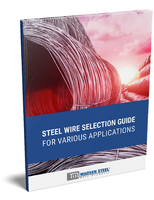Reinforcing Bar Standard has higher yield strength added.
Press Release Summary:
ASTM International Subcommittee A01.05 on Steel Reinforcement revised ASTM A706/A706M, Specification for Low-Alloy Steel Deformed and Plain Bars for Concrete Reinforcement, by adding higher yield strength level: Grade 80 [550]. As grade relates to minimum yield strength in units of kps/in.² (megapascals), Grade 80 [550] implies min yield strength of 80 ksi (80,000 psi) or 550 MPa. Use of higher strength reinforcing bars reduce reinforcement congestion in earthquake-resistant structures.
Original Press Release:
Significant Revision Made to ASTM Specification for Low-Alloy Steel Reinforcing Bars
W. CONSHOHOCKEN, Pa.-ASTM International Subcommittee A01.05 on Steel Reinforcement has made a significant revision to ASTM A706/A706M, Specification for Low-Alloy Steel Deformed and Plain Bars for Concrete Reinforcement. A higher yield strength level, namely Grade 80 [550], has been added to the standard.
The term "grade" relates to minimum yield strength in units of "kps/in.2 (megapascals)," i.e., "Grade 80 [550]" implies minimum yield strength of 80 ksi (80,000 psi) or 550 MPa. Subcommittee A01.05 is under the jurisdiction of ASTM International Committee A01 on Steel, Stainless Steel and Related Alloys.
From its original approval in 1974 until recently, the ASTM A706/A706M standard covered a single yield strength level, Grade 60 [420]. The standard was developed in response to the engineering community's requirements for steel reinforcing bars with controlled tensile properties for use in earthquake-resistant structures and restricted chemical composition for weldability.
In recent years, there has been a movement to add a higher strength grade to the standard. Use of higher strength reinforcing bars can reduce congestion of reinforcement, thereby enhancing constructibility in earthquake-resistant structures.
A question surfaced during the early stages of developing the proposed revision: can such Grade 80 [550] steel be produced commercially? Four producers of reinforcing bars, with steel mills located in California, Oregon, South Carolina and Washington, volunteered to make trial heats. The trial heats of steel were rolled into several sizes of reinforcing bars. The successful trial heats confirmed that it was feasible to make the higher strength steel and meet the requirements in the proposed revision for controlled tensile properties and restricted chemical composition.
David P. Gustafson, chairman, Subcommittee A01.05, and a consultant, says the requirements in the recently issued A706/A706M-09b are compatible with the provisions for higher-strength steel reinforcement in the American Concrete Institute's Building Code Requirements for Structural Concrete (ACI 318). Gustafson added that A615/A615M, Specification for Deformed and Plain Carbon-Steel Bars for Concrete Reinforcement, was also revised recently by the addition of Grade 80 [550].
To purchase ASTM standards, visit www.astm.org and search by the standard designation number, or contact ASTM Customer Relations (phone: 610-832-9585; service@astm.org). ASTM International welcomes and encourages participation in the development of its standards. For more information on becoming an ASTM member, visit www.astm.org/JOIN.
ASTM International is one of the largest international standards development and delivery systems in the world. ASTM International meets the World Trade Organization (WTO) principles for the development of international standards: coherence, consensus, development dimension, effectiveness, impartiality, openness, relevance and transparency. ASTM standards are accepted and used in research and development, product testing, quality systems and commercial transactions.
View this release on the ASTM Web site at www.astmnewsroom.org.
ASTM Committee A01 Next Meeting: May 17-20, May committee week, St. Louis, Mo.
Technical Contact: David P. Gustafson, Winthrop Harbor, Ill., Phone: 847-731-3585; davidgustafson1@att.net




